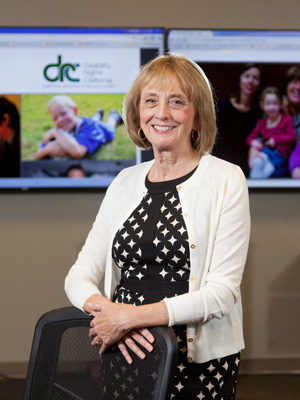Catherine Blakemore: A fierce civil rights leader for the
disabled
By Amy Yarbrough
Staff Writer
Although she’s been involved in key national efforts and
systemic litigation that have helped ensure the rights of thousands of people with
disabilities, Catherine Blakemore says sometimes even basic things can leave a
big mark.
 |
| Catherine Blakemore |
In the late 1980s, Blakemore filed a class action that
helped speed the release of people from state institutions. As a result, one of
the class members, a man with intellectual disabilities named Jimmy White, got something
else also very important to him: to wear his hair the way he wanted.
“When we saw him, he had grown his hair out and wore a very
full beard,” said Blakemore, explaining that the institution’s staff previously
made White’s grooming decisions for him. “Someone like Jimmy White isn’t
going to know he has a choice.”
White now lives independently in the North Coast area,
helped by support staff.
“I think it’s very compelling to kind of secure people’s
freedom for them,” she added.
It’s for those victories – both big and small – that
Blakemore, the executive director of Disability Rights California, has been
selected as this year’s recipient of the Loren
Miller Legal Services Award. The award recognizes people who’ve shown a
long commitment to legal services and extending those services to the poor.
Blakemore, who has a 39-year-history of fighting for
equality for people with disabilities, many of them indigent, fits the bill and
then some, according to attorney Valerie Vanaman, a former colleague.
Vanaman, who worked alongside Blakemore for many years at
the Legal Aid Foundation of Los Angeles, said Blakemore “is a person who is
very dedicated and committed to working with those least able to take care of
themselves.
“She’s given all of her professional life to working with an
underrepresented population,” she said.
Vanaman and Blakemore also served on one of the legal teams
that worked on the far-reaching class-action suit Chanda Smith v. Los
Angeles Unified School District. At the time, many students with special needs
in the district were not receiving a comparable education and were segregated
from children without disabilities. The suit resulted in an order that improved
services for about 80,000 students.
Paula Pearlman, assistant chief counsel at the Department of
Fair Employment and Housing, called her “a natural partner and ally in
coalition building and extension and development of disability civil rights.”
Blakemore continues to work advocating change through
legislation, Pearlman said.
“This award is not for her past glories. She continues to do
the work,” she said.
Growing up in Southern California, Blakemore recalls being
instilled with a desire to help others. Blakemore’s grandmothers and a
great-grandmother were teachers, as was her mother, who was frequently assigned
to work with children who had more trouble learning.
“Doing good in the world and achieving justice was a family focus,”
she said.
Blakemore got her first taste of legal services working at
the student clinic at Loyola Law School, helping out everyone from low-income
tenants with uninhabitable housing, to people being harassed by debt collectors
or those having trouble getting the right education for their kids.
Blakemore joined the Legal Aid Foundation in 1978, not long
after passage of the federal Individuals with Disabilities Education Act
(IDEA), which is designed to ensure that kids with disabilities receive an
appropriate public education.
“It was a real opportunity as a young lawyer to start from
the ground up, figuring out what this statute meant,” she recalled.
Back then, children with disabilities were not only segregated from
other children in schools, but in a lot of cases educated at different
sites entirely, Blakemore said.
She recalls one client in particular, named Jeremy, who had
been forced to attend a different school after being rendered quadriplegic by a
drunk driver.
“They said the reason was his ventilator made noise that
might distract other children,” she said. “It seemed to me such a violation of
his rights, basic human rights.”
Blakemore was ultimately successful in his case.
“To me that was a perfect example of how the law could be
used to vindicate an individual’s rights,” she said.
James Preis, executive director of Mental Health Advocacy
Services Inc. in Los Angeles, met Blakemore in the late 1970s when the movement
for disabled rights first began to explode.
Blakemore had just finished her stint at a Loyola Law School
clinic, one of the first to work on rights for the disabled. But in the decades
since, Blakemore’s name has been associated with dozens of cases advocating for
mental health services, public access to transportation and special education
for people with disabilities.
“The whole area around services for children with
disabilities in schools was a brand-new legal area,” Preis said. “The law
changed dramatically.”
Blakemore joined Disability Rights California, initially as a
managing attorney, in 1980. Her legal victories over the years also included successfully
litigating Butterfield v. Honig in 1988. It resulted in students in Los
Angeles County with mental health issues receiving mandated health services.
In 2013 and 2014 Blakemore led successful efforts to get
legislation passed to improve regional centers – which serve people with
developmental disabilities – making sure their services are evenly distributed
across ethnic and racial communities, that those who use them are provided
services in their own languages and allowing for more flexibility to purchase
services that are most useful.
Blakemore counts among her strengths her ability to come up
with creative solutions that work for both sides in a dispute. She is also particularly
proud of helping to change attitudes about people with disabilities and said
she remains excited about her work despite decades of doing it.
“Every day in this job is different and exciting and a
chance to make a real difference in people’s lives,” Blakemore said. “There’s a
new case to be brought or new clients to help.”
– Staff Writer Psyche Pascual also contributed to this story.